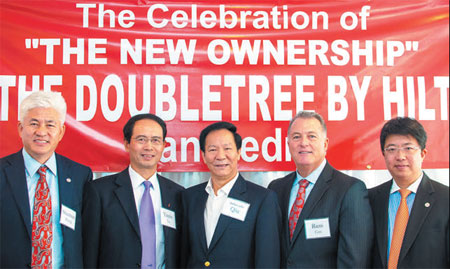Hotels aside, AVIC needs to grow its service arm
|
From left: Zhang Xuming, president of Aviation Industry Corp of China (AVIC) US; Yu Yiming, senior vice-president of AVIC International and chairman and CEO of Continental Motors Inc; former Chinese consul general in Los Angeles Qiu Shaofang; Russ Cox, vice-president of Rim Hospitality Crop; and Cui Wei with the AVSTAR Company take a photo after AVIC US bought three hotels in the US. Provided to China Daily |
Zhang Xuming, president of Aviation Industry Corp of China (AVIC) US, is feeling pretty proud about his investment in several hotels this year.
The Double Tree hotel on the coast of San Pedro in Southern California, for one, is proved to be a good deal. Zhang paid $15 billion - a little over the estimated market price - for the hotel. It has maintained an average occupancy rate of 90 percent since the ownership transfer last spring.
"Generally speaking, to make profit a hotel only needs to have over 70 percent (room occupancy rate)," Zhang said.
Recently, he closed a deal buying three Marriott hotels - located in Fullerton, California; Atlanta, Georgia; and South Field, Michigan.
The Fullerton hotel is near the Cal State-Fullerton campus, he said, so it could reasonably be expected to have a high return on investment.
Those are "investments by chance", he explained. A more meaningful task for the jet-maker this year is MRO (maintenance, repair and overhaul).
For civil aviation, AVIC is focused on regional jets. Two types of planes are in the making: the ARJ (advanced regional jet) 21, delivery of which begins next year, and the C (China) 919, which will be ready in four to five years.
When the ARJ21 and C919 are flying, they'll need an MRO network to keep them safely in the air.
According to Zhang, most of the buyers of the two regional jets are airlines in China, and more than 20 airlines in Southeast Asia and Africa.
Indonesia's Merpati Nusantara Airlines and Air Zimbabwe already fly AVIC's Modern Ark 60 (MA60) 60-seat turboprop, which is made by China's Xi'an Aircraft Industrial Corporation under AVIC.
AVIC had reportedly received more than 90 orders for MA60s. The factory had delivered 23 MA60s by the end of 2006, and expects to deliver an additional 165 units by the end of 2016, which include three MA60s delivered to the Republic of Cameroon and a first one to Cambodia last year.
Also last year, AVIC signed with the Kenya government a $650 million deal to build Kenya's new Greenfield airport. It's AVIC's No 1 overseas' project so far.
This year, AVIC is ranked 212th among Fortune 500 companies. It's the fifth year that AVIC has been listed since 2009. The gigantic state-owned company has more than 200 sub-organizations, among which more than 20 are publicly listed, and about 400,000 employees.
Though there is not a huge number of clients in the US yet, Zhang's playing a key role in building an MRO network: He's buying MRO service companies, or building partnerships with them and making copies of their services to other countries and regions.
It's another case of good timing.
Zhang said that in China airlines still have their own MRO arms, such as Air China's Ameco (Aircraft Maintenance and Engineering Corporation). But the trend in the US is that airlines no longer keep their own MRO departments; MROs spin off from the airlines and become independent service providers to multiple airlines.
AMR, American Airlines' parent company, not long ago announced a strategic reinvestment of up to $100 million to help build a long-term maintenance business, and attract third-party work.
"That's why there's a lot of resources available in the market. I'm currently talking with a couple of MRO companies [for potential partnership or purchase]," said Zhang.

























